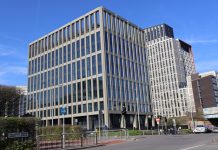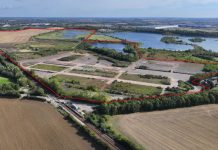Ryden has issued its latest detailed analysis of the Scottish Property market.
Its 80th Scottish Property Review looks at office, industrial, retail & leisure and investment property trends over the past six months, and how external factors such as weak economic expansion and ongoing political uncertainty have impacted the commercial property market.
Office property in Edinburgh has seen market demand continue at a good pace, with strong demand from Technology, Media and Telecommunications (TMT) which accounted for 26% of total take-up. In Glasgow demand has been a little more subdued at this point in the market cycle. There is better news for Aberdeen where demand is starting to recover in line with rising oil prices bringing confidence back to the city.
Industrial property demand in Scotland’s central belt, especially for units of good quality, continues strongly and the development market is now responding with a number of projects completing or on site. Despite this there is still an insufficient choice of modern premises to meet demand or to attract inward investment. In Aberdeen the industrial property market is still experiencing challenging conditions and is not yet benefiting from the oil price increase which has seen office property transactions increase.
Retail & leisure property experienced an increase in demand in 2016 but this has not been sustained as consumer expenditure has weakened. The only operators who are notably looking for expansion opportunities are coffee shop chains and budget supermarkets, while high street banks continue to dispose of branches. The sector remains focused on prime streets, malls and retail parks. Ryden’s prime retail index, covering Scotland’s top 20 shopping locations, has broadly kept pace with retail price inflation since 2013 but has stalled in 2017.
Investment property continues to be affected by political uncertainty. That said there have been some notable sales across Scotland in recent months, particularly in Edinburgh. Aberdeen has also seen investor activity begin again. Investor focus is on undoubted rental income through strong tenants, prime locations and long leases. At the smaller private investor end of the market, political uncertainty has been largely ignored and demand is strong, fuelled by low interest rates and the perceived risk of a stock market correction
Commercial property market outlook in summary:
- Economic growth in Scotland is forecast as moving from 1.2% to 1.4% for 2017 to 2019 (source: Fraser of Allander Institute).
- Glasgow and Edinburgh office demand is stable but high quality supply is tightening.
- Strong prime industrial demand is now triggering speculative development in key areas.
- Retail is facing multiple challenges but prime locations remain strong.
- The forecast for investment returns is 3.2% in 2017, 4.3% in 2018 and 5.8% in 2019 (source: Investment Property Forum Consensus).



















